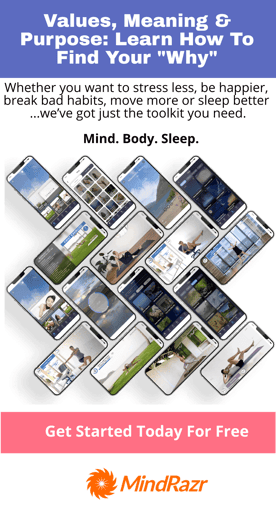Finding Your “Why?” - The Value of Meaning and Purpose
If I asked you to describe some things that you would really want to have in your life, there’s a good chance that somewhere in the top three, you’d say “happiness”. Nearly everyone wants to experience happiness, don’t they? And there’s absolutely nothing wrong with that. Happiness has a number of health benefits for us. You can read about some of them here.
If I asked you to describe some things that you would really want to have in your life, there’s a good chance that somewhere in the top three, you’d say “happiness”. Nearly everyone wants to experience happiness, don’t they? And there’s absolutely nothing wrong with that. Happiness has a number of health benefits for us. You can read about some of them here.
The ancient Greek philosophers like Plato and Aristotle put a lot of effort into thinking about happiness and how we can experience it as humans. In essence, they described two ways that we could experience happiness and those two ways essentially remain today as our best understanding of how to be happy. Those two pathways to happiness are Hedonia and Eudaemonia (pronounced you–duh–moan–ya). But what they bring us and how we achieve each of them is very different.
Hedonia
Hedonia is the pursuit of happiness through doing things that make us feel good. The idea of hedonia is that we feel pleasure, joy and happiness and an absence of discomfort or pain. So when you’re in the midst of running the City to Surf in Sydney, or a marathon, although you might feel satisfied with your efforts you’re unlikely to be experiencing hedonia because there is typically significant discomfort and even pain involved in that amount of effort.
The current research literature about happiness, flourishing and human vitality suggests that hedonia can play an important role in some key experiences for us – including more sleep, carefreeness, more positive feelings, fewer negative feelings, less depression, anxiety and stress.
So from a point of view of your own health and well-being, there are lots of reasons – very good reasons – to do things that lead to you feeling good. But is that all there is to happiness?
Eudaemonia
Although the concept of Eudaemonia has been with us for hundreds and hundreds of years, the research into its health benefits has emerged only more recently. Eudaemonia is generally considered to have four components –
• AUTHENTICITY: honesty, integrity
• MEANING: caring about the big picture, contributing
• EXCELLENCE: virtue, quality performance
• GROWTH: learning, maturity
So we are likely to experience eudaemonia when we are true to ourselves and our own values; when we have a sense of purpose and can see what we do as part of a bigger picture; when we do things for the benefit of others; when we strive to be the best versions of ourselves that we can be and when we seek to learn from everything that we do.
The other key part of eudaemonia relates to the health benefits that come from this experience. In short, there appears to be a strong link between living in this way that connects us to our values and sense of purpose and health outcomes like reduced lifetime illness and extended lifespan.
The state of eudaemonia occurs when we live within our “true nature” or “true self”. This is the definition of the “daemon” part of the word eudaemonia. How do you live within your true nature or true self? You begin by identifying values and purpose.
Values are the beliefs about ourselves and about our lives that we hold onto very strongly and ideally try to live by. Our values may include things like practising gratitude, displaying kindness to others, accumulating wealth, being honest and open, being persistent in the face of challenge and there are many, many more. Although there is a widely held view that the range of human values is reasonably fixed and common to all people, any individual’s set of values is likely to look different from another person’s.
One of the best ways to identify purpose in your own life is to answer this question: “What do I want others to remember about me when I’m no longer here?” This question immediately calls us to reflect on what matters to us, why it matters and what we can do to ensure that we leave some sort of mark or footprint on the planet long after we are not here any more.
Once we connect strongly with our own values and our own sense of purpose, we are well along the path to being able to state the “Why?” that we can use to underpin and support what we do in daily life. One of the really important aspects of having a significant “Why?” to what we do is that it supports the development of self efficacy. Self efficacy is one of the more important dimensions to life. When we have high levels of self efficacy, it means that we are experiencing a great deal of satisfaction in what we do; we are enjoying “mastery experiences”; we are likely to experience “flow” in what we do and over time this is likely to contribute positively to our self-esteem.
Putting it into action
If you want to learn more about and understand your own values, you could start by taking a free online values inventory such as the one found here or here. This is a great exercise, takes little time and will help you to understand more about yourself and be able to describe what really matters to you.
To connect with your own sense of purpose in life and to be able to describe it to others, I recommend spending some time reflecting on the following questions. I’d also encourage you to write your thoughts as you reflect on these questions so that you can go back and review and modify them at a later date.
Our sense of purpose can shift for all of us over time. Mostly these are small shifts. But every so often, a person may have a “life changing experience” that causes them to significantly re-evaluate what they were doing in their life, what they were living for and what their purpose is.
Here are the questions:
· What do I hope people will say about me when I’m no longer here?
· If I wanted people to remember my name 100 years from now, what would I have done?
· What would I like my children to remember about me as a parent?
· What do I hope my children could say I contributed to the world?
· If I could do one thing that was of benefit to others, what would that be?
One of the keys to doing this exercise is to think BIG. We often underestimate our own capacities for making changes in our own lives and making a difference in the lives of others. Reflecting on the questions above is an opportunity to be bold in your thinking and to be daring enough to describe some things that you would like to do that perhaps you’ve not felt confident about saying so far in your life.
Once you’ve been able to learn about and understand your own values and once you can describe your sense of purpose to others, you’re in a great position to begin reflecting on the extent to which the things that you do day-to-day bring life to those values and that purpose. Stated another way, you’ll have a really powerful “Why?” to underpin what you do each day.
The more you make a practice of living in the “Why?”, the more likely you are to derive deep satisfaction from what you do, enjoy significant relationships and connections with people around you and you’ll be much more likely to sustain long-term behavioural changes that you might wish for.
And if your goal is to live a happy life, then the best way to work towards this is to ensure that you have experiences of both hedonia – doing things just because they feel good and you enjoy them, as well as eudaemonia – doing things that are consistent with your core values as a person and that make a positive difference in the lives of people around you.
Simon Matthews
FASLM, MHlthSci, DipIBLM, MAPS
Writing exclusively for MindRazr, Simon is the CEO of Wellcoaches® Australia, an AHPRA Registered Psychologist, Board Certified Lifestyle Medicine Professional, Fellow of the Australasian Society of Lifestyle Medicine and Fitness Trainer.
Share this
You May Also Like
These Related Stories

Happiness, Resilience and Managing Stress

Developing an Attitude of Gratitude





